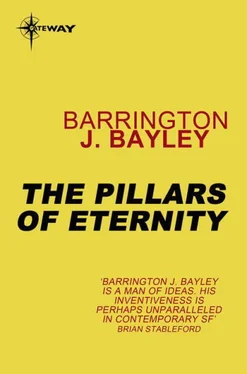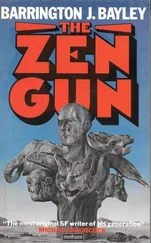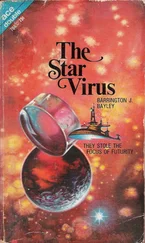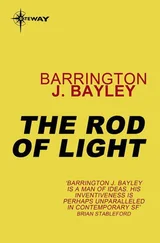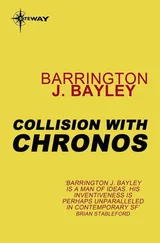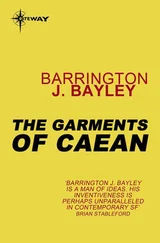It was not the first time he had seen such gems. Briefly he had begun to investigate two specimens brought back from the first landings on Meirjain, before the Scientific Ministry for which he then worked had closed down all such work in panic and impounded the jewels. He believed they had been destroyed.
‘Thank you,’ he said with feeling. ‘Thank you.’
‘When shall I see you again?’
‘Call me in a few days. Better leave now. I want to get down to work.’
‘Yes, of course.’ Shyly, hesitantly, Boaz turned to go. He would have liked to stay, to watch or assist his co-conspirator, but he knew that Ebarak did not want him there, and besides, the longer he stayed the more he increased the danger to the scientist.
He dialled the same travel agency he had come by and emerged, only slightly unsteady, back onto the walkway. For some time he drifted with the throng as before. Then he entered an eating house, sat and watched the passersby through the transparent frontage. As he knew from his previous visit, when he had sought and eventually made the acquaintance of Aban Ebarak, Kathundra was a place of affected mannerisms. People who met on the street greeted one another with exaggerated gestures and flourishes. Which, he supposed, made the offhanded casualness of Ebarak a distinctive mark of individuality.
After a while he returned to his ship. Mace was not there. He sat in his armchair, relaxed, and fell into a semi-doze. Without any prompting on his part, the ship began to send out its spy-beams, bringing him the habitual montage of scenes from the surrounding city.
He paid them only a fraction of his attention; he was like a man who kept the video switched on all the time. He showed a little more interest when the beam brought him a picture of Mace. It was hardly a coincidence, especially in a city of such size. Boaz had realized that the ship showed him Mace much more often than chance would account for. It was, he reasoned, obeying his subconscious wish to keep watch over her.
Usually he did not linger over her escapades, but this time some unformed impulse made him hold the image steady. Mace was in a private room with two others, a man and a woman. The woman was voluptuous like Mace, with heavy breasts and hips: the nymphgirl fashion was long out of date here on Kathundra. All three were naked, except that the man and woman wore gas masks. And they were spraying some kind of pearly mist over Mace from nozzles they held in their hands. The mist billowed over her skin and seemed to be absorbed by it. It drifted in her mouth and nostrils. As all this happened, her face took on a look of extraordinary, ever-increasing ecstasy.
Boaz knew that the mist was a sex-enhancing drug. He knew, too, from the look on Mace’s face, that she had switched on several of her bone functions.
The man and woman put aside the nozzles, ripped off their gas masks, and fell together on Mace. In moments all three were squirming and rocking together. Boaz, seeing the incredible intensity of the pleasure Mace was experiencing, was struck by a totally new thought which brought him instantly to wakefulness.
Could there be, to the horrendous negative experience that had ruined his life, a positive one of equal intensity? Was it possible to know pleasure, or happiness, in the same degree in which he had known pain and misery?
Could that be his salvation? Could there be a cancelling of effects?
Gradually he faded out Mace’s continuing transports of delight. He ordered the spy-beam withdrawn from the city and then sat alone in the darkness. It seemed a wonder to him that he had never considered this before. After all, equilibrium was one of the basic principles of the colonnader card pack….
But no. The idea was fanciful, absurd. It seemed that his long cohabitation with the girl was causing his mind to wander.
He began thinking about the time-gems, and to wonder instead if Aban Ebarak would make any progress.
Two local days later Aban Ebarak received another visit, this time entirely unannounced.
But it was not without forewarning. He had rigged up a simple apparatus to project the images flashing so unpredictably from the time-gems onto a screen (though he had not, yet, worked out a way to capture a gem’s output on all facets simultaneously). On the screen, the door of the laboratory opened and a tall slender figure, wearing a hooded street cloak clasped at the throat, entered. Ebarak was able to study the face for several seconds before the image faded.
By resuming the investigation so rudely interrupted years before, he had been able to calibrate the angle through which light was refracted on entering a gem. The scene he was witnessing registered a time bracket of five minutes either way of the present. Since it had not happened yet, it would happen shortly.
Patiently he waited, until a small sound came from the other side of the door.
‘Come in, Cere,’ he called without turning his head.
The door opened and in walked Cere Chai Hebron, Director of the Department of Scientific Affairs, and econospheric Cabal member.
‘How did you recognize me?’ Hebron said in genuine surprise. He undid his cloak’s throat-clasp, threw back the hood and pulled a flat, flesh-coloured device from the side of his neck. Immediately his face began to change its appearance, no longer pulled into a false shape by the device’s neurological control over his facial muscles. The real face that now showed was pale and finely chiselled, like Ebarak’s, but unlike his it had a sultriness about the mouth, a hint of passion about the eyes, when Hebron listened or spoke intently.
‘The eyes, Cere,’ Ebarak said. ‘You forgot to disguise the eyes. That gadget couldn’t fool me.’ He was amused. A survey had once revealed that thirty-eight percent of scientific workers – a far higher percentage than chance could account for – had eyes of the same cool blue hue. There was still argument over what the finding meant.
Hebron sighed. It was a habit of people of his class to disguise themselves when moving alone in public. In this case he had an additional reason for doing so. He was putting himself at risk by being here at all.
‘There’s something else,’ Ebarak said. ‘You probably imagine I saw you come into the vestibule through a monitor. I didn’t. I watched you enter this laboratory – in advance.’
He spun a wheel, backtracking the recorder and running the scene again for Hebron’s benefit.
‘Time-gem?’ Hebron asked, staring at the few seconds of action in fascination.
‘Yes. You already know I have them, of course. That’s what brings you here.’ He paused. ‘It would make a good warning system, if it could be made reliable.’
‘But productive of paradoxes?’ Hebron suggested as the scene faded.
‘Oh, I don’t think so. Paradoxes don’t exist in the real world.’ Ebarak turned away from the screen, switched off the apparatus and swivelled to face Hebron. ‘I would have got word to you that I have the gems. You know that, don’t you?’
‘Do I?’ said Hebron acidly. Feeling the heat of the laboratory, he removed his cloak. Draping it over one arm, he stared down at Ebarak in schoolmasterly fashion. ‘You should have let me know immediately . This matter has been given top priority. It is only a matter of time before Orm’s bloodhounds track you down, and this Joachim Boaz, too. I shall protect you for as long as I can, but it would be easier if you had confided in me.’
‘Orm?’
‘He’s now chief of the Rectification Branch. And he’s a brute, I promise you.’
‘How did you find out I have the gems?’
‘My own people have been watching you. You met Boaz once, years ago. It seemed possible he would seek your help.’
Читать дальше
